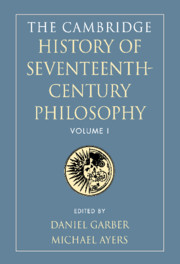Book contents
- Frontmatter
- Introduction
- I The context of seventeenth-century philosophy
- II Logic, language, and abstract objects
- III God
- 10 The idea of God
- 11 Proofs of the existence of God
- 12 The Cartesian dialectic of creation
- 13 The relation between theology and philosophy
- 14 The religious background of seventeenth-century philosophy
- IV Body and the physical world
- V Spirit
- Bibliographical appendix
- Bibliography
- References
11 - Proofs of the existence of God
from III - God
Published online by Cambridge University Press: 28 March 2008
- Frontmatter
- Introduction
- I The context of seventeenth-century philosophy
- II Logic, language, and abstract objects
- III God
- 10 The idea of God
- 11 Proofs of the existence of God
- 12 The Cartesian dialectic of creation
- 13 The relation between theology and philosophy
- 14 The religious background of seventeenth-century philosophy
- IV Body and the physical world
- V Spirit
- Bibliographical appendix
- Bibliography
- References
Summary
The question of the existence of God is central for the seventeenth century at a time when atheism is no longer just an individual standpoint but a philosophical school and a genuine system of thought. Standing behind the new atheism of the seventeenth century was a new approach to the question of the nature of God. The scholastics of earlier years had first asked an sit Deus, whether God exists, and then discussed at length His nature: quid sit. But in the seventeenth century, the traditional order was reversed, as Descartes explicitly declared: since one cannot seek to establish the existence of that which one does not know, before knowing whether God exists, it is necessary to define His identity. This change in perspective allowed the question of the existence of God to become a legitimate topic of atheist critiques concerning God's function in the new mathematical and mechanical universe of seventeenth-century philosophy. At this point, atheism ceased to be the easily dismissed rantings of the fool and became a real epistemological possibility. This break was crucial for metaphysics, and it is in this context that we must understand Descartes's preoccupation with proofs of the existence of God. The Cartesian discourse constituted a necessary reference for all later systematic examinations of the question, whether they were positively inspired by Descartes (Spinoza, Malebranche, Leibniz) or explicitly opposed him (Gassendi, Hobbes, Locke, Berkeley).
THE CONDITIONS OF ATHEISM
How did scholars come to speak of ‘proofs’ of the existence of God outside the classical problematic concerning God? In 1581, in the treatise De la vérité de la religion chrétienne, the Protestant Philippe Duplessis-Mornay, a great apologist of Christianity, wonders whether proofs of God are really necessary. But in the end he reconciles himself to the task: 'Let us nonetheless dedicate this chapter, with the permission of all charitable men, to the wickedness of our century.'
- Type
- Chapter
- Information
- The Cambridge History of Seventeenth-Century Philosophy , pp. 305 - 330Publisher: Cambridge University PressPrint publication year: 2000
References
- 1
- Cited by



